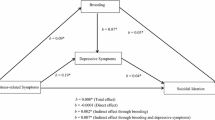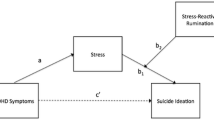Abstract
Research on cognitive theories of depression has identified negative cognitive styles and rumination in response to depressed mood as risk factors for depressive episodes. In addition, a general self-focusing style has been suggested to increase vulnerability to depression. The present study used a behavioral high-risk paradigm to test whether the interaction of negative cognitive styles and rumination predicted the prospective onset, number, and duration of depressive episodes in a sample of 148 initially nondepressed undergraduates over a 2.5-year follow-up. In addition, rumination was assessed specifically as the tendency to focus on maladaptive self-referential thoughts following stressful events (stress-reactive rumination; SRR). The principal hypotheses tested were (1) the interaction of negative cognitive styles and SRR increases risk for developing depressive episodes as well as longer duration depressive episodes; and (2) this interaction would not be obtained when a trait measure of general self-focus or a measure of rumination in response to depressed mood is used instead of the measure of SRR. After controlling for subsyndromal depressive symptoms and the main effects of negative cognitive styles and SRR, the interaction of negative cognitive styles and SRR was found to predict the prospective onset, number, and duration of major depressive and hopelessness depressive episodes. These interactions were not obtained when other measures of trait self-focus and depressive rumination were used instead of SRR.
Similar content being viewed by others
Author information
Authors and Affiliations
Corresponding author
Rights and permissions
About this article
Cite this article
Robinson, M.S., Alloy, L.B. Negative Cognitive Styles and Stress-Reactive Rumination Interact to Predict Depression: A Prospective Study. Cognitive Therapy and Research 27, 275–291 (2003). https://doi.org/10.1023/A:1023914416469
Issue Date:
DOI: https://doi.org/10.1023/A:1023914416469




